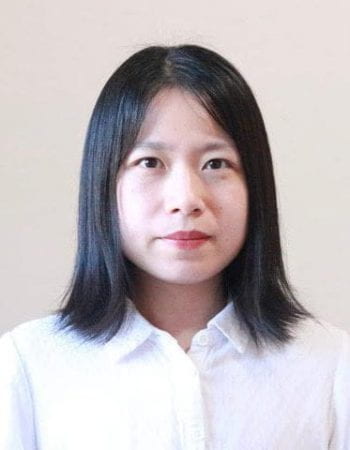
A map created by SJSU graduate students presents data from San José’s Parks, Recreation and Neighborhood Services.
Data has the power to transform communities.
Just ask Saritha Podali, ’22 MS Data Analytics, and Fengling Zhou, ’22 MS Data Analytics. As part of a new partnership with San José State and the City of San José — supported by the Knight Foundation — the pair played a key role in gathering, interpreting and presenting data that can help the city provide resources to those who need it most.
San José’s Parks, Recreation, and Neighborhood Services (PRNS) offers scholarships for qualifying residents to participate in youth activities and after-school programs. While the city has always sought to ensure the scholarships went to those most in need, certain questions persisted: Were the people receiving the scholarships getting the right amount of aid? Who was being left out, and why?

Saritha Podali, ’22 MS Data Analytics
Enter the Mayor’s Office of Technology and Innovation who, thanks to a partnership with SJSU’s MS Data Analytics program, brought Podali and Zhou on board to tackle the issue in what was dubbed the city’s Data Equity Project.
“We define data equity as using the city’s data ethically and in ways that drive equitable outcomes for constituents,” explained Julia Chen, project manager for the Data Equity Project.
Starting in April, Zhou and Podali got to work mining PRNS data — by organizing records from 2009 to 2019 using the programming language Python — to paint a full picture of who was enrolling in the youth programs and who was receiving financial support.
“One of our primary objectives was to provide PRNS folks who might have little or no tech background with an easy-to-use, interactive experience to present the trends to their board,” explained Podali.

Fengling Zhou, ’22 Data Analytics
And that’s exactly what they did: Their final presentation to PRNS and Mayor Sam Liccardo included an interactive map identifying the city’s most vulnerable communities by ZIP code and how many scholarship dollars were allocated to those areas compared to others. Plus, it highlighted where certain communities indicated a need for programs that were unavailable locally by attending those outside their immediate area.
Podali and Zhou, along with others who worked on the project, shared a list of recommendations on how to use the data, which PRNS plans to do, explained Hal Spangenberg, interim division manager of PRNS.
“We will use this data and information to help inform key decisions in the allocation and distribution of scholarship funds and hopefully increase scholarships to those most in need,” he said.
“We can’t overstate the value of the dashboards they created,” Chen added. “Now, the PRNS team has a level of data and truth they can refer to as they make their future decisions.”
“Data is not anonymous,” she continued. “These are people’s lives we have in our hands. It’s not just analysis for the sake of analysis; we are ultimately here to hopefully better the lives of residents of San Jose. That’s the importance of having local students doing this kind of work and bringing their local context to the table. We need to understand the community we’re serving, so it made sense to partner with the university, where there’s a pipeline of talent.”

A demonstration of the interactive map created by Podali and Zhou for the City of San José.
One of the goals of the SJSU MS Data Analytics program is to show students that they can apply analytics to solve relevant, real-world problems, explained Ruth Duran Huard, dean of the College of Professional and Global Education (CPGE).
“One of our core learning objectives is for our students to integrate multidisciplinary knowledge to engage in practical data analytics projects, from analyzing requirements to managing data, building models, presenting results and assessing societal impacts,” she noted.
“The partnership of CPGE’s Applied Data Science department with the City of San José speaks to our university’s commitment to connect and contribute within our communities,” Huard continued. “To be able to support the city in its efforts to meet its data systems needs and develop an overall data strategy has been invaluable, especially for our faculty and students.”
Mohamed Abousalem, SJSU’s vice president for research and innovation, says this collaboration is an example of how the university’s research expertise can have tremendous public impact.
“SJSU has several areas of research expertise that intersect with the City of San José’s interests and priorities,” he said. “This collaboration was a demonstration of how our students and faculty can help the city make data-informed decisions based on expertise and skill in data analytics. Our partners have a great opportunity to tap into the resources of today’s students to select tomorrow’s employees through meaningful and productive research and development projects.”
For Podali and Zhou, the experience broadened their understanding on the power of data.
“Being fair when creating policies to serve a community is hard,” noted Zhou. “But our data project provides evidence that will help the best decisions to be made.”
“This experience has helped me develop a new perspective of how data can be transformative for communities,” Podali said.
“I now realize the impact technology advancement has when it is leveraged across all walks of life,” she continued. “Studying community problems, identifying areas of improvement and assessing risks using data analytics is the need of the hour. As exciting as it is to work on groundbreaking artificial intelligence and machine learning technologies, it is equally important to ensure that communities receive enough help to position themselves in today’s world of technology.”
View the students’ final presentation, and learn more about SJSU’s MS Data Analytics program.
